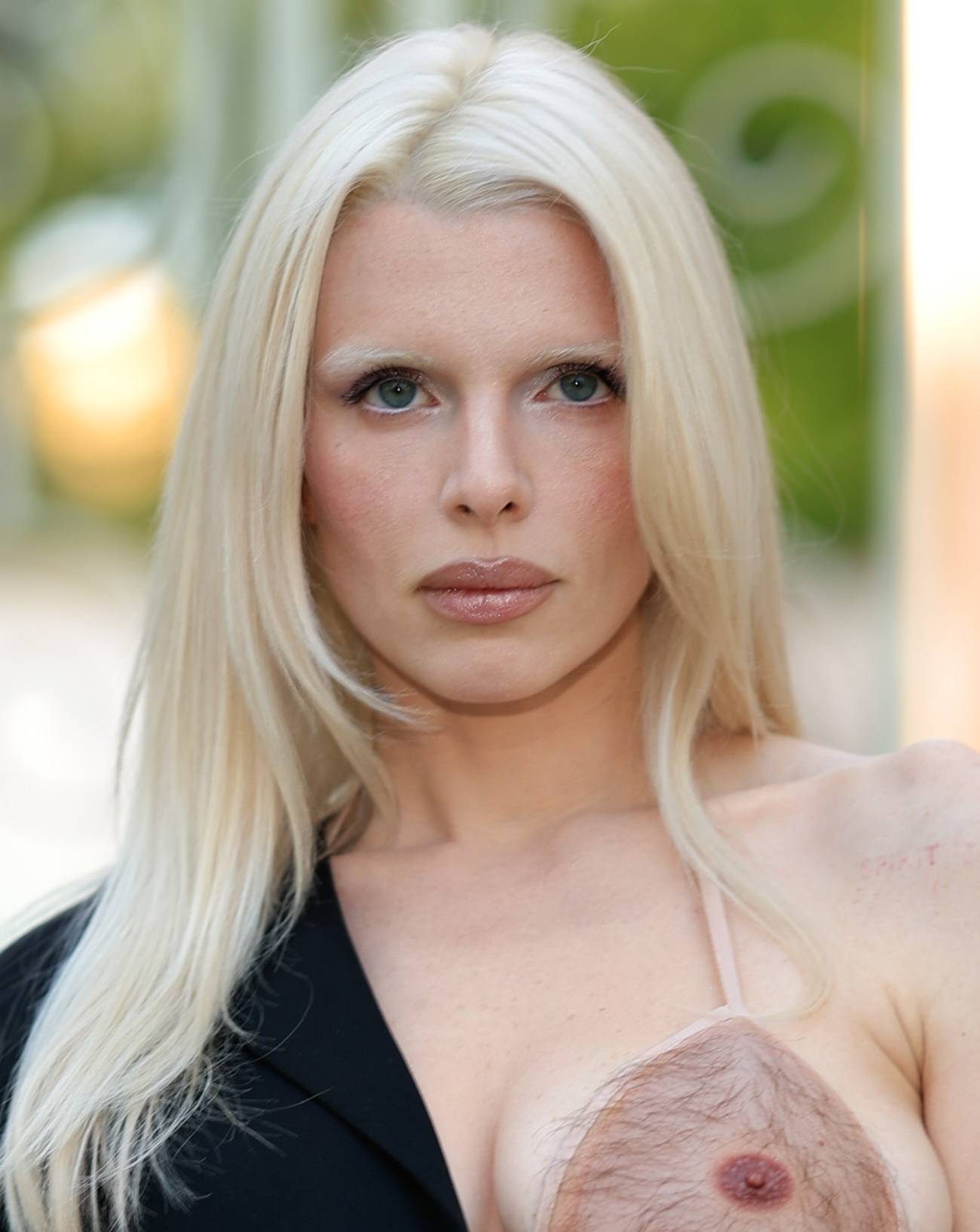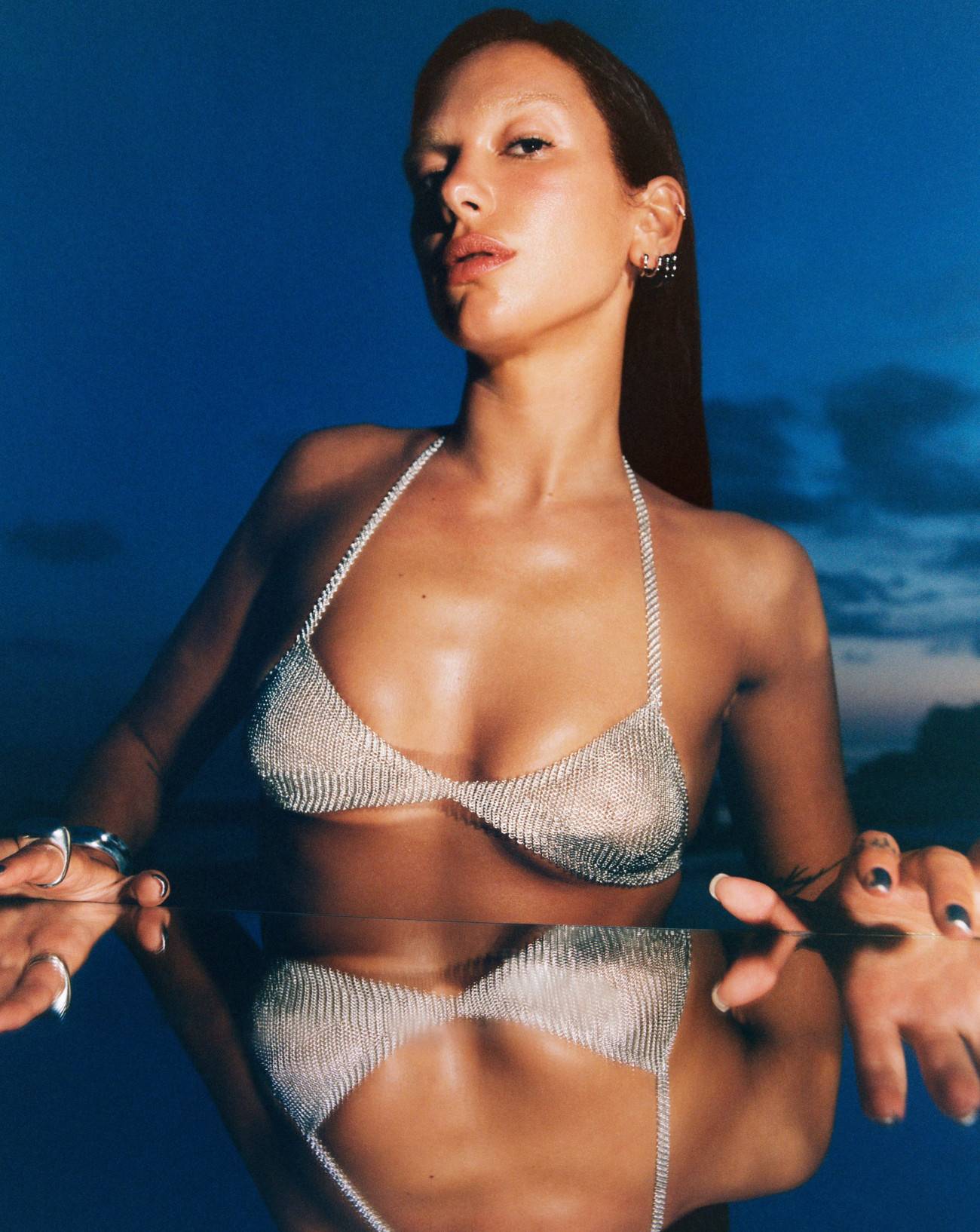Charli XCX par Sofia Sanchez et Mauro Mongiello. Réalisation : Rebecca Bleynie. Assistante styliste : Sophie Houdré. Maquillage : Hugo Villard chez Atomo Management. Coiffure : Cyril Laloue chez B Agency. Production : Nadia Lessard chez Talent and Partner
Mixing dance music and hip-hop, the 22-year‑old phenomenon writes songs of youthful rebellion that embody all the sassy insouciance of the star herself.
In the scene, Charli XCX is neither the perfect American fiancée like Taylor Swift, nor an alternative weirdo like FKA Twigs, but blazes her own rebellious trail between the two. Among the new generation of pop stars, she stands out through her I-don’t-give-a-damn freshness, which is rooted in an intelligent aversion to propriety and accepted codes of behaviour. Born and raised in Britain, 22-year-old Charlotte Aitchison has already had considerable song-writing success, from Icona Pop’s I Love It to her hit Boom Clap from the Fault in our Stars film soundtrack. But, unlike many of today’s stars who are obsessed with marketing, she refuses to perfect and codify her image, and has absolutely no desire to be accepted in the closed circles of fashion or hipness. She’s far too busy having fun raising a figurative middle finger to all those who expect her to toe the line and be “a pop star for teenyboppers.”
Finally available in Europe after an American release last year, her second album Sucker is not for the shy or prudish. From her love for the wild electro of French label Ed Banger to her affinities with the crazy hip-hop of Brooke Candy or Iggy Azalea, Charli XCX demonstrates her depth of field, not to mention vision. Raw, rough, powerful and multihued, her music takes an amused, disabused but always empathetic stance towards a world that has lost its way and drowns its despair in “having fun.” The result is reminiscent, in another register, of film director Harmony Korine’s pop masterpiece Spring Breakers. Sometimes silly, often terribly adolescent, Charli XCX’s latest opus is nonetheless totally necessary. By eschewing propriety, but without falling into fake provocation, she embodies a raw truth about today’s youth. It’s what’s so fascinating about her.
Numéro: You’ve called your new album Sucker – is this more in the sense of a “fool” or, as it comes across in French, a “fellater”?
Charli XCX: Yeah, the title is a bit aggressive. But I like its multiple meanings. More than anything it’s a middle finger to all those who doubted I could be an artist. The music industry is run by men, who immediately feel threatened when a woman’s in control. Artists like Brooke Candy, Iggy Azalea and myself threaten the industry to its foundations. And its reaction can be violent. Some people voiced doubts about my ability to write songs, for example. The root of this scepticism is simple: my vagina. My talent is called into question simply because I’m a woman.
The image of femininity you project in your videos is ambiguous. You clearly present yourself as a free woman, but also a terribly sexy one – the spectre of objectification never seems far away…
For me, the two aspects you’re talking about aren’t mutually exclusive. And I don’t think that being sexy makes me a Barbie doll or reduces me to an object. I dress above all for myself, in a way I like and that I enjoy. I don’t think that that necessarily matches what a man would want… It’s not like the stereotypes of a sexy woman which a lot of them still have in their heads.
Do you think things have reversed so that a woman’s being sexy is no longer a form of submission to male fantasies, but rather a way of taking control over men?
Exactly. And I hope to contribute to that. I’m very proud of my body. The female body is very beautiful. Through my music and my way of dressing, I ask people to celebrate that. Over the past few years there’s been a big movement by women to re-appropriate their bodies. Until recently, the female body was, and sometimes still is, an object of desire for men. But it belongs to us, it’s ours – it can’t be subject to any man.
Are you totally free from the weight of other people’s gazes?
More than I was at the time of my first album two years ago. Back then I was completely lost. I’m proud of True Romance, but I could have gone further. The album suffered from my fear of confiding anything too personal. I was much too obsessed with the idea of being “cool.” It’s something all teenagers go through, both girls and boys. I wanted my album to be cool. I wanted to be cool. And it took me several years to realize that it’s really not important. That what people think of me isn’t important. That freed me. It allowed me to make the music I really aspired to.
You didn’t want to surf on the success of True Romance?
After True Romance, I could have simply taken the easy path and done an album of collaborations with trendy producers and fashionable artists. It’s probably what was expected of me. I took the risk of pushing Sucker in a totally different direction: melodic and effective pop, I hope. I entirely own it, even if it might confuse my fans. I don’t aim to make songs that simply respond to the spirit of the moment, but to make music that will still be just as interesting and valid in ten years’ time. In any case, I’m not the sort of artist who does the same thing over and over again. I need to reinvent myself, call everything into question. Which might explain why this album is different, less dark. The darkness seems to have been replaced by a certain aggression, an anger…
A dose of punk?
That’s for sure. But let’s be clear: Sucker is not a punk album. To say so would be offensive both to the movement and to what it represents. And in any case, can you still be punk today? I would say that it’s possible to live the life you want to live, but that we’re a long way from the political reach of punk. Our times are rich in debate, but there don’t seem to be any major ideologies any more.A lot of young people are disorientated. Sometimes it’s difficult for them to feel they belong to a particular scene. In the music world, you don’t see a predominant movement anymore, but a multitude of different genres.
Your music is an invitation to party, which is also a form of escapism for a lot of teenagers…
Teenagers have always looked to escape from their backgrounds and from their lives, to be someone else. It’s part of being a teenager… and it’s very romantic.
Do you think your popularity obliges you to take a certain responsibility with regard to your youngest fans?
I’ve never made music with the intention of becoming a role model for the young. It’s a role that people sometimes try to cast me in, although I never asked for it. I make mistakes, who doesn’t? I don’t encourage my fans to follow my example, but rather to become the best version of themselves they can, and to develop all their potential.
Do you own everything you do? Even when it’s a question of “Going to the discotheque, getting high and getting wrecked,” as you sing in one track?
You’re referring to the song Breaking the Rules, which isn’t meant to be taken seriously. There’s a kernel of truth in it, of course. We all go out and party. Drinking too much and getting wrecked are pretty common these days. But this song is really about freedom. That’s the truth I want to share: not so much my personal experience of getting wrecked but the beautiful idea of being free. Sucker, much more than my first album, is built on lived experience. Everything in it is true apart from a few exceptions. I address subjects ranging from the difficulty of human relationships to masturbation…
What about the musical side of things? What inspires you?
This might surprise you, but I’m fascinated by French 1960s yéyé music. It’s rather a counter-model in terms of feminism, of course, but this kind of pop has been a great source of inspiration to me. Though obviously my album is much more rough and wild.
You also seem to be very into the imagery of American high schools, which is heavily present in your videos.
High schools interest me as spaces of transition. They’re places where teenagers grow up, experiment with stuff and evolve. As such, they’re absolutely fascinating. Not to mention their aesthetic which really appeals to me: the uniforms, the school bus, all that… I think the films I grew up with must have unconsciously influenced me – movies like The Craft, Jaws and Clueless, all of which play with codes relating to the American high school. I feel I’ve got a lot in common with Jaws – you know, the mixture of darkness and frankness, this sugary pop thing that treads the line of bad taste…
Sucker, by Charli XCX (Atlantic Records/Asylum Records/Warner Music), out now.














